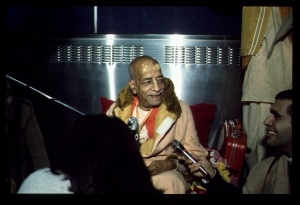SB 7.10.10: Difference between revisions
m (1 revision(s)) |
No edit summary |
||
| Line 1: | Line 1: | ||
{{info | {{info | ||
|speaker= | |speaker=Prahlāda Mahārāja | ||
|listener=Lord | |listener=Lord Nṛsiṁhadeva the Supreme Personality of Godhead | ||
}} | }} | ||
[[Category:Srimad-Bhagavatam - Canto 07 Chapter 10]] | |||
[[Category:Bhagavatam Verses Spoken by Prahlada Maharaja - Vanisource|071010]] | |||
<div style="float:left">'''[[Srimad-Bhagavatam]] - [[SB 7|Seventh Canto]] - [[SB 7.10: Prahlada, the Best Among Exalted Devotees|Chapter 10: Prahlāda, the Best Among Exalted Devotees]]'''</div> | |||
<div style="float:right">[[File:Go-previous.png|link=SB 7.10.9]] '''[[SB 7.10.9]] - [[SB 7.10.11]]''' [[File:Go-next.png|link=SB 7.10.11]]</div> | |||
{{RandomImage}} | |||
==== TEXT 10 ==== | ==== TEXT 10 ==== | ||
<div | <div class="verse"> | ||
oṁ namo bhagavate tubhyaṁ | :oṁ namo bhagavate tubhyaṁ | ||
puruṣāya mahātmane | :puruṣāya mahātmane | ||
haraye 'dbhuta-siṁhāya | :haraye 'dbhuta-siṁhāya | ||
brahmaṇe paramātmane | :brahmaṇe paramātmane | ||
</div> | </div> | ||
| Line 17: | Line 22: | ||
==== SYNONYMS ==== | ==== SYNONYMS ==== | ||
<div | <div class="synonyms"> | ||
''oṁ''—O my Lord, O Supreme Personality of Godhead; ''namaḥ''—I offer my respectful obeisances; ''bhagavate''—unto the Supreme Person; ''tubhyam''—unto You; ''puruṣāya''—unto the Supreme Person; ''mahā-ātmane''—unto the Supreme Soul, or the Supersoul; ''haraye''—unto the Lord, who vanquishes all the miseries of devotees; ''adbhuta-siṁhāya''—unto Your wonderful lionlike form as Nṛsiṁhadeva; ''brahmaṇe''—unto the Supreme Brahman; ''parama-ātmane''—unto the Supreme Soul. | |||
</div> | </div> | ||
| Line 24: | Line 29: | ||
==== TRANSLATION ==== | ==== TRANSLATION ==== | ||
<div | <div class="translation"> | ||
O my Lord, full of six opulences, O Supreme Person! O Supreme Soul, killer of all miseries! O Supreme Person in the form of a wonderful lion and man, let me offer my respectful obeisances unto You. | O my Lord, full of six opulences, O Supreme Person! O Supreme Soul, killer of all miseries! O Supreme Person in the form of a wonderful lion and man, let me offer my respectful obeisances unto You. | ||
</div> | </div> | ||
| Line 31: | Line 36: | ||
==== PURPORT ==== | ==== PURPORT ==== | ||
<div | <div class="purport"> | ||
In the previous verse Prahlāda Mahārāja has explained that a devotee can achieve the platform of bhagavattva, being as good as the Supreme Person, but this does not mean that the devotee loses his position as a servant. A pure servant of the Lord, although as opulent as the Lord, is still meant to offer respectful obeisances to the Lord in service. Prahlāda Mahārāja was engaged in pacifying the Lord, and therefore he did not consider himself equal to the Lord. He defined his position as a servant and offered respectful obeisances unto the Lord. | In the previous verse Prahlāda Mahārāja has explained that a devotee can achieve the platform of ''bhagavattva'', being as good as the Supreme Person, but this does not mean that the devotee loses his position as a servant. A pure servant of the Lord, although as opulent as the Lord, is still meant to offer respectful obeisances to the Lord in service. Prahlāda Mahārāja was engaged in pacifying the Lord, and therefore he did not consider himself equal to the Lord. He defined his position as a servant and offered respectful obeisances unto the Lord. | ||
</div> | </div> | ||
__NOTOC__ | |||
<div style="float:right; clear:both;">[[File:Go-previous.png|link=SB 7.10.9]] '''[[SB 7.10.9]] - [[SB 7.10.11]]''' [[File:Go-next.png|link=SB 7.10.11]]</div> | |||
__NOTOC__ | |||
__NOEDITSECTION__ | |||
Revision as of 16:41, 4 June 2021

A.C. Bhaktivedanta Swami Prabhupada
TEXT 10
- oṁ namo bhagavate tubhyaṁ
- puruṣāya mahātmane
- haraye 'dbhuta-siṁhāya
- brahmaṇe paramātmane
SYNONYMS
oṁ—O my Lord, O Supreme Personality of Godhead; namaḥ—I offer my respectful obeisances; bhagavate—unto the Supreme Person; tubhyam—unto You; puruṣāya—unto the Supreme Person; mahā-ātmane—unto the Supreme Soul, or the Supersoul; haraye—unto the Lord, who vanquishes all the miseries of devotees; adbhuta-siṁhāya—unto Your wonderful lionlike form as Nṛsiṁhadeva; brahmaṇe—unto the Supreme Brahman; parama-ātmane—unto the Supreme Soul.
TRANSLATION
O my Lord, full of six opulences, O Supreme Person! O Supreme Soul, killer of all miseries! O Supreme Person in the form of a wonderful lion and man, let me offer my respectful obeisances unto You.
PURPORT
In the previous verse Prahlāda Mahārāja has explained that a devotee can achieve the platform of bhagavattva, being as good as the Supreme Person, but this does not mean that the devotee loses his position as a servant. A pure servant of the Lord, although as opulent as the Lord, is still meant to offer respectful obeisances to the Lord in service. Prahlāda Mahārāja was engaged in pacifying the Lord, and therefore he did not consider himself equal to the Lord. He defined his position as a servant and offered respectful obeisances unto the Lord.